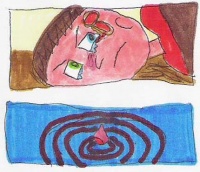Difference between revisions of "Sub-Episodes"
SeventhBase (talk | contribs) m |
|||
| Line 5: | Line 5: | ||
Typically each sub-episode is inspired by some actual event in Christian's life that left him so utterly traumatized that he felt the need to express himself and tell his side of the story in comic form. Sub-episodes are primarily Chris's way of seeking external validation -- by presenting these stories he hopes [[Boyfriend-free girl|someone]] will read them and pity (and therefore love) him. For this reason the stories always assert Christian's righteousness while dwelling on his pain and suffering. | Typically each sub-episode is inspired by some actual event in Christian's life that left him so utterly traumatized that he felt the need to express himself and tell his side of the story in comic form. Sub-episodes are primarily Chris's way of seeking external validation -- by presenting these stories he hopes [[Boyfriend-free girl|someone]] will read them and pity (and therefore love) him. For this reason the stories always assert Christian's righteousness while dwelling on his pain and suffering. | ||
The first four sub-episodes appear in ''Sonichu'' #0-3. It could be argued that the Sonichu stories in these comics are nothing more than a Trojan-horse scheme to get people to read the sub-episodes, so they can learn what a special snowflake Christian is. [[Sonichu 4|''Sonichu'' #4]] is dedicated entirely to sub-episodes, | The first four sub-episodes appear in ''Sonichu'' #0-3. It could be argued that the Sonichu stories in these comics are nothing more than a Trojan-horse scheme to get people to read the sub-episodes, so they can learn what a special snowflake Christian is. [[Sonichu 4|''Sonichu'' #4]] is dedicated entirely to sub-episodes, reprising the first four and introducing four more, with Sonichu himself reduced to cameo appearances. This could be interpreted as Christian finding response to the initial sub-episodes insufficient, and trying to hammer his points home with a full-fledged all-Christian issue. On the other hand, by [[Sonichu 5|''Sonichu'' #5]] the sub-episodes are obsolete since Chris believes he has found a [[sweetheart]], so it is also possible #4 was intended to clear out a backlog of these stories. | ||
A common theme in many sub-episodes is Christian loitering in a store somewhere until super-powered security guards demand that he leave the premises. Chris then uses his own super powers to fight back, and he is generally defeated, necessitating the arrival of one of his characters to save him. After his foes are vanquished so that they cannot make him leave, Chris delivers a self-important speech with an excessively specific, [[Chris and Ego|Chris-centric]] moral and leaves anyway. Even in his fantasy world, Chris manages to [[Fail]]. | A common theme in many sub-episodes is Christian loitering in a store somewhere until super-powered security guards demand that he leave the premises. Chris then uses his own super powers to fight back, and he is generally defeated, necessitating the arrival of one of his characters to save him. After his foes are vanquished so that they cannot make him leave, Chris delivers a self-important speech with an excessively specific, [[Chris and Ego|Chris-centric]] moral and leaves anyway. Even in his fantasy world, Chris manages to [[Fail]]. | ||
Revision as of 21:22, 25 July 2010
Sub-episodes are backup features in the Sonichu comics that relate tales of Christian's adventures during his Love Quest. Nobody knows why he calls them sub-episodes, but it's nice to know he at least TRIES to keep his non-existant social life out of the main plot. Chris stated in the videobook for Episode 12 Part 1 that he stopped making sub-episodes because his mom made him.
Typically each sub-episode is inspired by some actual event in Christian's life that left him so utterly traumatized that he felt the need to express himself and tell his side of the story in comic form. Sub-episodes are primarily Chris's way of seeking external validation -- by presenting these stories he hopes someone will read them and pity (and therefore love) him. For this reason the stories always assert Christian's righteousness while dwelling on his pain and suffering.
The first four sub-episodes appear in Sonichu #0-3. It could be argued that the Sonichu stories in these comics are nothing more than a Trojan-horse scheme to get people to read the sub-episodes, so they can learn what a special snowflake Christian is. Sonichu #4 is dedicated entirely to sub-episodes, reprising the first four and introducing four more, with Sonichu himself reduced to cameo appearances. This could be interpreted as Christian finding response to the initial sub-episodes insufficient, and trying to hammer his points home with a full-fledged all-Christian issue. On the other hand, by Sonichu #5 the sub-episodes are obsolete since Chris believes he has found a sweetheart, so it is also possible #4 was intended to clear out a backlog of these stories.
A common theme in many sub-episodes is Christian loitering in a store somewhere until super-powered security guards demand that he leave the premises. Chris then uses his own super powers to fight back, and he is generally defeated, necessitating the arrival of one of his characters to save him. After his foes are vanquished so that they cannot make him leave, Chris delivers a self-important speech with an excessively specific, Chris-centric moral and leaves anyway. Even in his fantasy world, Chris manages to Fail.
Trolls generally prefer the sub-episodes to the regular comics, as Chris's IRL exploits where he is trolled by mall security guards tend to be more amusing than the bland adventures of a Mary Sue Sonic recolor.
Whilst newer comics do not have sub-episodes for the reasons stated above, the storylines generally relate to something that has happened to Chris (most often involving trolls) relatively recently; this is most obvious in Sonichu 10, where Chris "amends" several of his IRL issues in the safety of his comic-book world.
See also
- Sonichu 4 - The full collection of Sub-Episodes.
